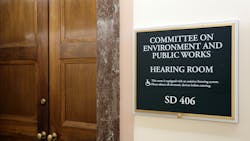Key points from Jessica Kramer's opening statement and Q&A at Senate committee hearing
The U.S. Senate Committee on Environment and Public Works (EPW) held a committee hearing on March 26, 2025, to consider the nomination of Jessica Kramer to be Assistant Administrator of the U.S. Environmental Protection Agency (EPA) Office of Water.
Kramer was nominated by President Trump on February 11, 2025.
The committee hearing also considered the nominations of Sean Donahue to be EPA General Counsel and Brian Nesvik to be U.S. Fish and Wildlife Director.
Opening statement from Jessica Kramer
Kramer began her opening statement by thanking President Trump for the nomination and the opportunity to be considered for the Assistant Administrator of the EPA Office of Water.
“If confirmed, it will be the highest honor of my career to work everyday with the dedicated career staff in the Office of Water to protect human health and the environment, and support Administrator Zeldin as he does the same,” said Kramer during the nomination hearing.
Kramer highlighted her childhood in central Wisconsin where she grew up on 80 acres of land. Her family utilized the land to grow and sell Christmas trees.
“Growing up, I learned the importance of stewardship, and that is what drove me to become a natural resource major in my undergraduate studies and ultimately to focus on environmental law in earning my legal degree,” Kramer said.
Kramer highlighted some of the previous positions she has held, including:
- Wisconsin Department of Natural Resources: Started career as environmental enforcement specialist where she worked with a community to replace lead service lines.
- Wisconsin Department of Justice: Environmental prosecutor and defense attorney.
- Drinking water and wastewater associations: Government affairs specialist, where she advocated for a polluter pays model as it pertains to PFAS pollution.
- Florida Department of Environmental Protection: Deputy secretary for regulatory programs.
- Water counsel for then ranking member Shelley Moore Capito: Led negotiations for the minority on the Drinking Water and Wastewater Infrastructure Act of 2021.
“Each of these positions has further refined my true passion for securing access to clean and safe water services for everyone in this country,” Kramer said.
Kramer concluded her opening statement by focusing on the regulatory landscape, and promoting the need for common sense regulation.
“A regulated community has no hope for compliance if it does not have a definitive and clear framework to work from,” she said.
Approaches to regulation
EPW Chairman Shelley Moore Capito questioned Kramer on how she would get the EPA Office of Water back to results driven approaches rather than bureaucratic processes.
Kramer said that when looking at EPA’s regulatory matrixes she would like to look at opportunities to innovate and expedite the processes, which echoed a similar sentiment from her opening statement about her "perspective on the importance of common sense regulation."
"For example, regulating water systems across this country out of business through siloed rule makings without providing an acheivable path for compliance is simply not good government, nor is it good public health policy," Kramer said.
WOTUS
U.S. Senator Kevin Cramer asked Kramer to walk him through the new guidance regarding Waters of the United States (WOTUS) in the context of the Sackett v. EPA ruling.
Kramer stated that she hoped the guidance document released by the EPA is straightforward and clear. She said that the EPA and the U.S. Army Corps of Engineers will follow the law. She also stated that the Sackett v. EPA ruling was prescriptive and sets up definitions on what WOTUS is.
U.S. Senator Dan Sullivan asked Kramer to ensure him that permafrost wetlands are not considered Waters of the U.S. Kramer said that she cannot prejudge a rule making outcome and that she will follow the Sackett v. EPA decision to the letter of the law.
Cooperative federalism
U.S. Senator Kevin Cramer also asked Kramer to define cooperative federalism. Kramer used the underground injection control well program in the Safe Drinking Water Act as an example of cooperative federalism.
“This is an example of a program that can be delegated from federal implementation to the state – for them to actually implement the program,” Kramer said. “The great thing about that is the states know their resources the best.”
Kramer stated that this would allow states to be more stringent in the restrictions that they put in place.
Funding freeze
U.S. Senator Lisa Blunt Rochester asked Kramer if she knew about the funding freeze that occurred when President Trump first took office and how it affected the EPA and its programs.
Kramer stated that the funding was paused and reviewed when the new administration took office, but State Revolving Funds (SRFs) and the Water Infrastructure Finance and Innovation Act (WIFIA) funding has continued. She noted in her speech that one state stopped receiving funds for lead line replacement, but the EPA Office of Water clearly communicated that funding should not be held.
Kramer pointed out that, if nominated, she would focus on technical assistance for small and rural communities.
About the Author
Alex Cossin
Associate Editor
Alex Cossin is the associate editor for Waterworld Magazine, Wastewater Digest and Stormwater Solutions, which compose the Endeavor Business Media Water Group. Cossin graduated from Kent State University in 2018 with a Bachelor of Science in Journalism. Cossin can be reached at [email protected].

